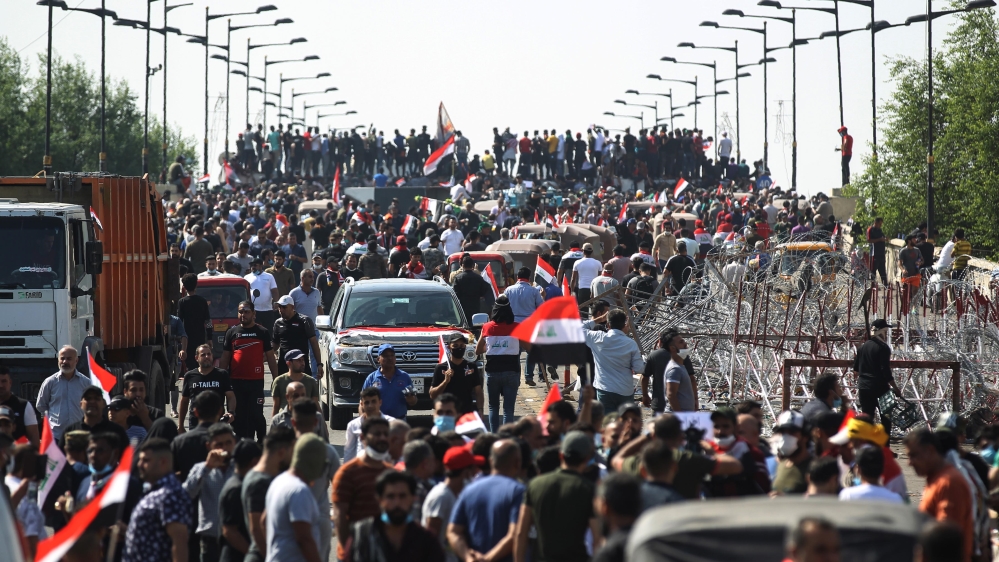Security forces in Iraq have fired tear gas to disperse protesters in the capital, Baghdad, before a planned march on parliament where the government is set to hold an emergency session to discuss the resumption of deadly demonstrations.
Despite the police's effort to clear them, hundreds of protesters dug in around Baghdad's Tahrir Square on Saturday, demanding Prime Minister Adel Abdul Mahdi's government resign over corruption, mass unemployment and poor public services.
Al Jazeera's Natasha Ghoneim, reporting from the protest site, said the mood in Baghdad was tense after security forces opened fire on demonstrators in the capital and several southern cities on the previous day, killing at least 42 people.
"People here are furious. Some are trying to storm barricades leading to the Green Zone, where government offices and the parliament building are located," she said.
"They want the government to go. Security forces are using lots of tear gas and stun grenades."
There were calls for fresh protests in the south as well despite authorities announcing curfews across several provinces on Saturday.
Legislators are scheduled to meet at the parliament at 1:00 pm (10:00 GMT) to "discuss protesters' demands, cabinet's decisions and the implementation of reforms".
The Iraqi commission for human rights said the death toll from Friday's protests stood at 42. It said more than 2,300 people were wounded.
The Interior Ministry, meanwhile, praised what it called the restraint shown by security forces on Friday.
"The security forces secured the protection of demonstrations and protesters responsibly and with high restraint, by refraining from using firearms or excessive force against demonstrators," the ministry said in a statement on Saturday.
The unrest came three weeks after an earlier bout of rallies, in which more than 150 people were killed in a crackdown by security forces.
People gathered at the Tahrir Square said they were struggling to make sense of what they called the security forces' excessive use of force, claiming all they carried on them were flags and water to fight off tear gas and rinse their eyes.
"Just yesterday, we lost more than 30 men ... We need a safe country," said Batoul, a 21-year-old protester.
"We want to have a life literally. It's not about jobs or money, it's about being in a good country that we deserve. We have a great country but not a great government," she told Al Jazeera.
Another protester decried perceived corruption and cronyism in the country.
"It's enough - theft, looting, gangs, mafias, deep state, whatever. Get out! Let us see a (functioning) state," he told AFP news agency, as puffs of smoke from tear gas rose behind him.
The ongoing turmoil has broken nearly two years of relative stability in Iraq, which in recent years has endured an invasion by the United States and protracted fighting, including against the Islamic State of Iraq and the Levant (ISIL or ISIS) armed group.
The demonstrations have posed the biggest challenge yet to the year-old government of Abdul Mahdi, who has pledged to address demonstrators' grievances by reshuffling his cabinet and delivering a package of reforms.
The moves have done little to quell the demonstrators, however, whose ire is focused not just on Abdul Mahdi's administration but also Iraq's wider political establishment, which they say has failed to improve the lives of the country's citizens.
|
Dozens killed as anti-government protests grip Iraq (2:29) |
Many view the political elite as subservient to one or other of Iraq's two main allies, the US and Iran - powers they believe are more concerned with wielding regional influence than ordinary Iraqis' needs.
Nearly three-fifths of Iraq's 40 million people live on less than six dollars a day, World Bank figures show, despite the country housing the world's fifth-largest proven reserves of oil.
Sami Hamdi, editor-in-chief of the UK-based International Interest magazine, said Iraq had seen similar mass protests in the past, but they had dissipated because of a lack of leadership.
"And the other dynamic that many or not talking about, which painful to say, is that Iraqi society is itself very divided. Many Iraqi voted in elections across sectarian lines, and therefore it produced a sectarian government. These parties rewarded their loyalists with public sector jobs," he said.
"While the protesters are united over their basic rights, they are not united over who should give it to them."
https://www.aljazeera.com/news/2019/10/iraqi-forces-tear-gas-baghdad-protests-continue-191026092400502.html
2019-10-26 11:26:00Z
52780418716427


Tidak ada komentar:
Posting Komentar